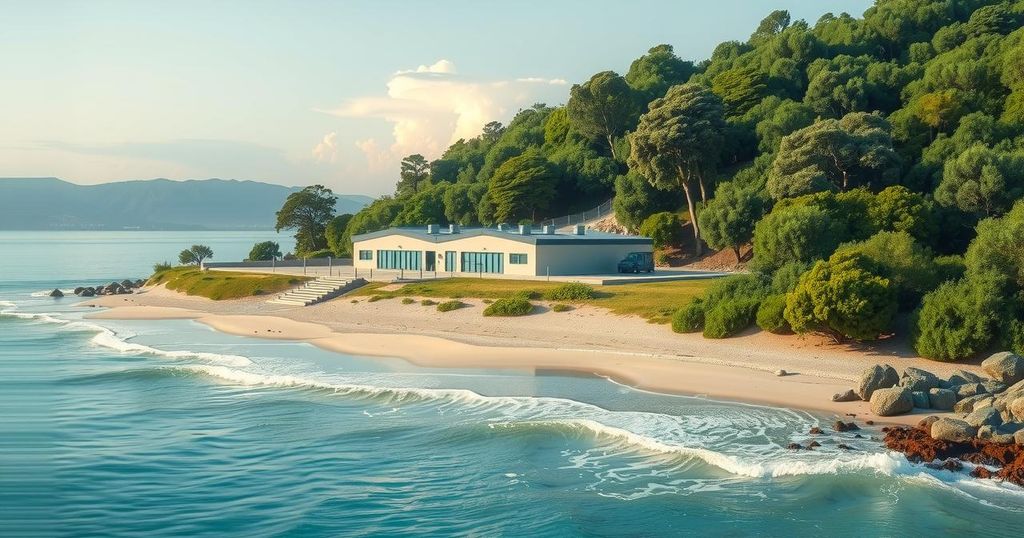Politics
ALBANIA, ASIA, BROTHERS OF ITALY, CHINA, COLOMBIA, DEPORTATION, ECJ, ED, EDI RAMA, EU, EUROPE, EUROPEAN COURT OF JUSTICE, EUROPEAN UNION, GI, GIORGIA MELONI, HE, HEGSETH, IMMIGRATION, ITALY, JAPAN, MATTEO PIANTEDOSI, MELONI, MEXICO, MIGRATION, NORTH AMERICA, ROME, SOUTH AMERICA, US
Clara Montgomery
Italy Reconfigures Albanian Migrant Centers as Repatriation Facilities
Italy has announced that its Albanian migrant centers will be repurposed as repatriation facilities for migrants awaiting deportation. This move follows ongoing legal challenges and minimal occupancy rates. Prime Minister Meloni’s government, under scrutiny from opposition and legal experts, argues this shift will not incur additional costs. The strategy aligns with Europe’s broader discussions on immigration.
In a recent announcement, Italy’s government stated that its Albanian migrant centers would now be utilized as repatriation facilities for individuals awaiting deportation. Originally opened in October as processing centers for potential asylum seekers intercepted at sea, these centers are under close scrutiny from EU partners. Prime Minister Giorgia Meloni’s administration is focusing on utilizing these centers to hold migrants prior to their repatriation to their home countries.
This strategic shift permits migrants already present on Italian soil to be transferred to Albania, a non-EU state, while awaiting deportation. Despite presenting her revised strategy as a bold and unprecedented approach to immigration, Prime Minister Meloni’s initiative has faced numerous legal challenges, leading to minimal occupancy within the centers.
Italian judiciary systems have consistently mandated that migrants intercepted at sea be transported to Italy instead of being detained in Albania. The European Court of Justice (ECJ) is currently reviewing the legality of this immigration policy. Interior Minister Matteo Piantedosi expressed optimism in a recent statement, indicating that the new decree would reactivate the migrant centers without incurring additional costs.
The framework for these centers was established in a 2023 agreement between Meloni and Albanian Prime Minister Edi Rama. Under this policy, Italy is responsible for the centers where migrants deemed to originate from “safe” countries could have their asylum claims fast-tracked. However, initial attempts to utilize the centers led to legal complications, as the first group of migrants was sent back to Italy following judicial rulings that challenged their detentions.
Italy’s opposition has critiqued the scheme as a lavish expenditure, citing an estimated annual cost of €160 million, and raised concerns regarding the protection of migrants’ rights within these facilities. Former Prime Minister Matteo Renzi described the repatriation centers as unnecessary, attributing their existence to government propaganda. Meanwhile, Democratic Party leader Elly Schlein has expressed doubts about the legal foundation of moving repatriation centers out of Italy, contending that such actions violate European law.
Legal experts have indicated that the government’s recent changes are an attempt to demonstrate effectiveness while preparing for future EU regulations that may allow outsourcing of migrant centers to third countries. Nonetheless, the potential for a surge in legal appeals remains, as critics argue that the government’s actions lack a solid legal basis and highlight the Albanian model’s failures. Additionally, according to Frontex, undocumented migration via the Central Mediterranean route saw a 59 percent decrease last year, further complicating the context of Italy’s immigration policies.
Italy’s recent adjustment of its migrant centers reflects a strategic pivot towards repatriation, aiming to effectively manage migration while meeting legal challenges. Prime Minister Meloni’s administration aggressively promotes this initiative despite facing significant opposition and potential legal issues. As the situation evolves, it remains critical to monitor the implications for both migrants’ rights and Italy’s legal commitments under EU law.
Original Source: www.arabnews.com








Post Comment